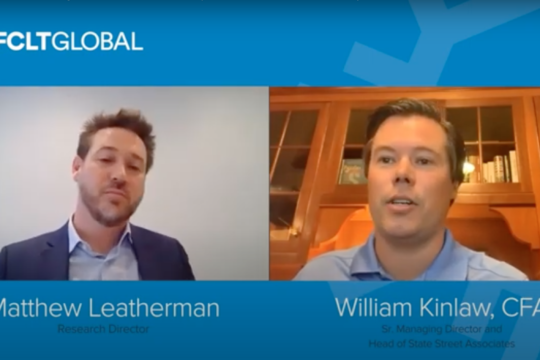
By Matthew Leatherman & Victoria Tellez

By Matthew Leatherman & Victoria Tellez
Investors around the world agree that navigating emerging responsibilities is an essential component of long-term decision-making. Such responsibilities extend beyond an investor’s fiduciary duty or stewardship requirements – they may include the comprehensive well-being of constituents, the entity’s license to operate, or the health of markets, society, or the planet.
Expectations placed on investors are ever-changing, can emerge from any of the institution’s many constituents, and extend beyond matters of law, regulation, or contracts. Investors may take on some of these external expectations as their own responsibilities. When faced with such a decision, investors need a process for determining whether to accept an expectation as a responsibility, defer it to the future, decline it, or take an active leadership role in driving action against it.
Recent, real-world cases illustrate how external expectations can shape and alter investors’ responsibilities. Investors offered a number of examples in the session that FCLTGlobal led at ICPM’s Fall Forum. State Street shared a similar case about the intersection of securities lending and stewardship in their publication Aligning Responsible Investing with Securities Lending.
In this publication, Marty Tell, Global Head of Securities Finance, and Patricia Hudson, Global Head of ESG Strategy, “outline the ways in which stock lending can be aligned with responsible investing.”
“With the 2019 announcement from Japan’s government pension fund that it was suspending stock lending because of concerns that short sellers did not share the fund’s long-term focus,” State Street wrote, “there has been growing interest in how investors can align their commitment to responsible investing with an equity lending program.”
Using the borrowing process to separate voting rights from economic exposure is one example of GPIF’s concern. Marty Tell addresses it directly:
I know some ESG investors are concerned about the motivations of some of the borrowers, especially concerns about borrowing for control. In fact, there are multiple regulations across different jurisdictions that forbid borrowing for control. In the U.S., for example, there are Reg T and Reg SHO, under which investors can borrow stocks only for a strictly defined purpose, such as a short sale or a sale to fulfill certain delivery requirements. The Bank of England’s money market code also states, “securities should not be borrowed solely for the purpose of exercising voting rights.” The Global Master Securities Lending Agreement (GMSLA) also imposes rules around borrowing and collateral delivery. So, borrowing to control voting rights really isn’t an issue.
Preserving the ability to engage with management and to cast important votes is another important dimension of responsibility raised by equity lending, one that State Street readily acknowledges is a reason for limiting some loaning activity. “In cases in which the lenders do want to exercise their voting rights,” Tell affirms, “they can recall shares over the record date from a provider with a large pool of shares fairly easily.”
State Street is very clear that individual lending clients will have to make individual decisions about their responsibilities, in part because so many issues are implicated, including company microeconomics, regional macroeconomics, and taxation, in addition to voting and engagement. At the same time, the firm is clear about its responsibility.
“We believe that balance can be achieved through coordination and governance between the lender and the lending agent. Investors can determine up front which stocks to remove from lending, depending on their engagement campaigns, and agree on the process for recalling stocks in a timely way when necessary,” said Tell.
FCLTGlobal’s upcoming publication, Ripples of Responsibility: How Long-Term Investors Navigate Uncertainty with Purpose, will continue to explore investors’ multi-dimensional responsibilities and provide guidance on how to clarify and operationalize this decision-making process. State Street’s position on equity lending illustrates our research findings, and FCLTGlobal is grateful for this chance to share State Street’s case.
We welcome your input into FCLTGlobal’s broader, ongoing project on investors’ rights and responsibilities. For questions or suggestions, please contact Research Director Matt Leatherman at [email protected].

Risk and Resilience | Article
9 October 2018 - FCLTGlobal, with its Members, is developing practical tools to address the issue of balancing long- and short-term risks. Part of the process includes interviews with experts in the area of assessing, managing, and planning for investment risk. Below is the next in this series with Will Kinlaw and David Turkington, Senior Managing Director and Senior Vice President at State Street Associates, respectively. As State Street’s academic affiliate, State Street Associates is a unique partnership that bridges the worlds of financial theory and practice. SSA develops risk, investor behavior...

Risk and Resilience | Video
9 September 2020 - For many investors, asset allocation begins with an estimate of volatility, producing the most stable portfolio of assets that still can earn the target return. An assumption underpins this process – that volatility has a mathematically-certain relationship with time. That assumption is empirically false, and the ramifications for diversification and strategic asset allocation are enormous. Learn more from experts at State Street Associates about how the choice of risk timeframe influences a portfolio’s long-term success.

Governance | Article
17 October 2017 - FCLTGlobal’s Sarah Williamson, CEO, and Matthew Leatherman, Director of Research, recently sat down with Ronald O’Hanley to discuss the importance of long-term investing and the role of the board in affecting long-term change. Ronald O’Hanley is President and CEO of State Street Global Advisors, the investment management arm of State Street Corporation and an FCLTGlobal member. Sarah Williamson: What does long-term investing mean in a State Street Global Advisors context? Ron O’Hanley: As the third-largest asset manager in the world, we manage roughly $2.6 trillion, of which about $1.5 trillion in...